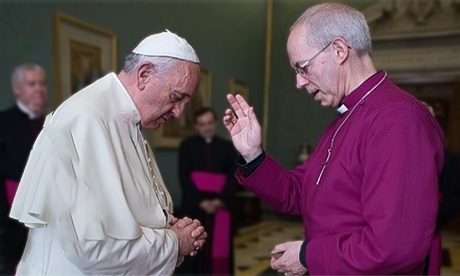Christian Unity is more than a “nice to have” it is an essential element of those who confess their vocation to live like Christ.
The scandal to the world is the disunification of the Christian churches. Ironically, in disunity, many find strength because they are “not like the others”.
They enjoy the separation because it gives their “brand” of “christianity” relevance. The brand difference is lauded as “evangelical”, “conservative” “progressive” “youth church”, “school-based”, “parish-centric”, and “social justice” within Catholic, Protestant, Reformed, Orthodox and more churches.
Many people confess the name Christian as a brand.
They are “brand Christian” but in their hearts, they desire individualism, not unity.
The “brand Christian” has all the language of Christ but cannot apply this language to anyone outside their construct of the Christian life.
The brand brings comfort and exclusion because each brand works to ensure its own brand culture, brand message and brand or target audience, demographic and consumer.
The brand forms a denomination in the widest sense and “christianity” becomes associated with the brand.
Rather than the brand being challenged or associated with Christ, it is the defended, often at the cost of lives.
Calling brand identification into question is dangerous because it challenges established, well defined and strongly defended boundaries and vested interests.
Brand “christianity” is called into question through the genuine search for Christian Unity.
Authentic Christianity lives in the search for unity.
It responds to Christ’s call to us to be of one mind, heart and faith.
Unity is framed by oneness and not by competition.
Unity and the hope of unity should be leading us all back to the common table of the Lord, Christ (mensa Christi Domini).
There are significant theological boundaries that have produced social, political, and cultural boundaries between Christians and their denominations.
These have to be acknowledged.
The significant theological boundaries are often so wrapped up in social and political histories that it is easier to deal with the theological than with the social and political.
Theological discourse is still the first discourse because Christian unity, and its disunity, is a theological problem.
Where significant theological boundaries exist we have to come back to basics and these basics are expressed in the theology and practice of baptism.
Baptism is the work of the Church-catholic or universal, not the work of individuals.
Where baptism is the source of shared theological discourse and the source of the desire for unity among Christians change can happen, but only if the baptised actually do something together.
Ecumenism requires action as much as it requires conversation.
Baptism is the source of a common vision and a common hope that gives us an authentic theological language and a creative theological imagination.
An authentic theological language gives voice to a powerful theological imagination that enables us to become more receptive and desirous of eucharistic communion.
Where an authentic baptismal theology leads the way an authentic eucharistic theology will follow.
Once these two are in place questions of theological authority, ecclesial authority, and political and social authority can begin to be resolved.
Keeping a comfortable religion is easier than reaching out beyond the boundaries of personal piety, parish life, school classrooms and such. Reaching beyond these nineteenth-century structures and personal worlds to engage in conversations with people who believe in Christ, but don’t use the words or frames of reference you might, is a challenge.
Pope Francis has asked us to reach beyond the parish, catholic school and diocesan boundaries in the Synodal Process and engage with people who no longer worship with us and live out our pastoral calling to ministry and service.
Many of these people have not lost their Christianity, but choose not to live it in communion with us.
The week of Christian Unity is an opportunity to open the door in the fence and step into the world of other Christian traditions or denominations and discover there, brothers and sisters who share the baptismal call to Christianity and the willingness to give themselves in service for the good of other.
Go say hello!
- First published in Kotahi Ano.
